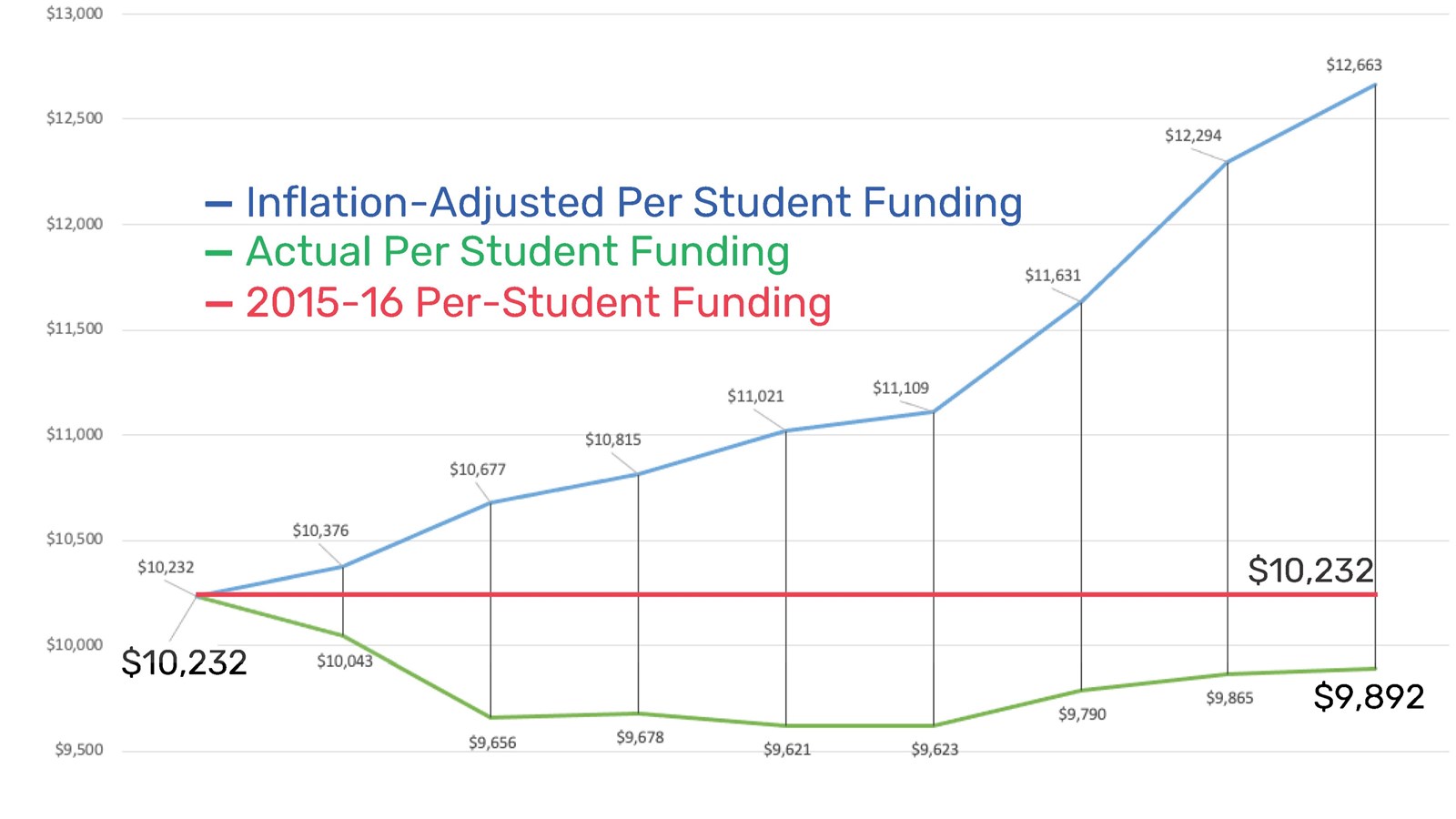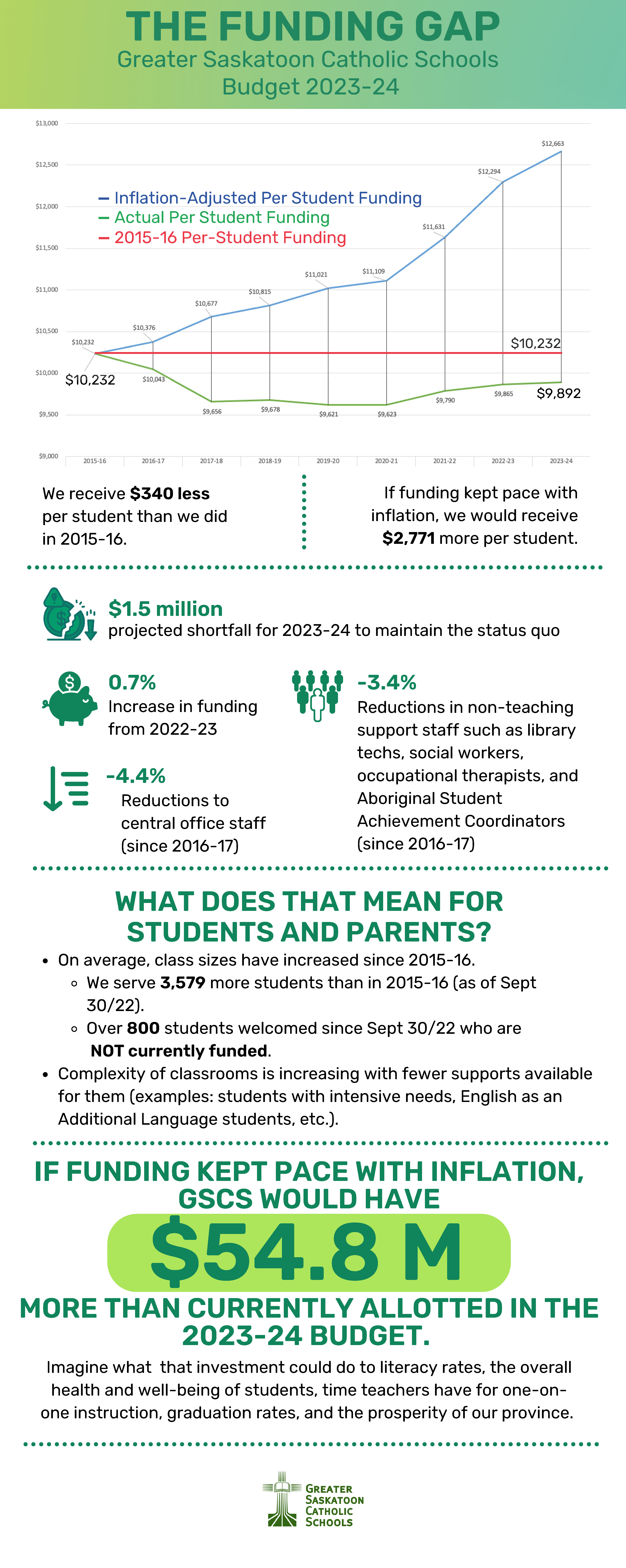Budget 2023-24 update

Xhrestoc Voskres! Christ is Risen!
Since the Government of Saskatchewan announced their budget in March, we have been reviewing the details of funding for Greater Saskatoon Catholic Schools and what that means for students, families and staff.
Our initial optimism faded when faced with the reality that school divisions in Saskatchewan—and therefore the students and families we serve—would not benefit from the province’s good financial fortune.
Kindergarten – Grade 12 funding for 2023-24
Before we share some details of what Greater Saskatoon Catholic Schools’ budget will look like for 2023-24, we want to address some things that have been said by the Government of Saskatchewan as they repeat their message of “record funding”.
Education funding will increase 6.7 per cent.
Funding for kindergarten – Grade 12 education is lumped-in with public libraries, early learning and childcare. Thanks to a provincial-federal partnership, childcare has benefited from a significant investment from the Government of Canada. That’s great news! But it skews the numbers for education quite a bit.
Kindergarten to Grade 12 funding has increased 2.5 per cent or $49.4 million.
The government’s figures are from March 2022’s budget day to March 2023’s budget day. What they’re not openly sharing is that figure includes money that has already been provided to school divisions: $15.5 million in the summer of 2022 for inflationary increases to insurance and transportation, and $20 million in November 2022 to accommodate higher than expected student enrolment across the province. That leaves $13.9 million of actual new money—or 0.7 per cent—for 2023-24. That’s for all 27 school divisions.
“You’ve been heard.”
On May 1, 2023, Premier Moe stated he has heard people speak up about inadequate education funding and that more funding would come. We are encouraged by these words. However, there is no detail on how much money will be provided nor when it will be given to school divisions. This uncertainty makes our planning very difficult. We’ll touch on this later in this letter.
GSCS funding for 2023-24
Our school division will receive an additional $4.7 million in 2023-24 to accommodate our projected enrolment growth of 700 more students. We will not receive any money to address increased costs as a result of inflation (utilities, transportation, insurance, CPP and EI increases, etc.), and there is no money for negotiated salary increases for non-teaching staff who, just like you, face inflationary pressures at home. (The government has stated they will cover negotiated increases for teachers after their bargaining concludes.)
If we were to maintain the same level of supports and programming in 2023-24 that we have now, we would run a $1.5 million deficit.
We must submit a balanced budget to the Ministry of Education before June 30, 2023. We do not have the luxury to wait until the fall for the possibility of additional funding. We must make difficult decisions now.
GSCS cuts to supports and programming
As has been the trend for several years now, we are in the unfortunate position where we will have to make some difficult decisions about programming and student supports. Instead of having discussions on how we can better serve students, we’re once again talking about what students and families will have to live without.
Our board will submit a balanced 2023-24 budget to the Ministry of Education before the end of June. Steps to balance our budget include:
- Recover cost of unfunded services through fees:
- Increase elementary school lunch supervision fee for schools in Saskatoon to $100 per student per year, capped at $200 per family (currently $70 per student or $140 per family per year)
- Details will be communicated at a later date
- Introduce high school lunch supervision fee of $25 per student per year
- Details will be communicated at a later date
- Increase after-hours facility rental rates
- Increase elementary school lunch supervision fee for schools in Saskatoon to $100 per student per year, capped at $200 per family (currently $70 per student or $140 per family per year)
- Reductions:
- Eliminate teacher librarian positions
- Eliminate Leveled Literacy Intervention (targeted literacy for vulnerable students)
- Eliminate attendance care team (targeted attendance support)
- Eliminate Extended Learning Opportunities (ELO) programming (centralized programming for gifted learners in elementary schools)
- Eliminate EcoJustice program (Gr. 8 outdoor experiential learning class)
- Reduce full-time (all-day, every-day) kindergarten from 10 schools to two
- Fewer bus routes and longer ride times to reduce the number of school buses required.
Moving forward
We are proud of and value all the work our staff does. Every. Single. Day. And we’re proud of the fortitude, persistence and resilience students and families show. Every. Single. Day.
A commitment of sustainable and predictable funding from the government would allow our dedicated staff to provide what students need and deserve to excel, not just get by. Eliminating supports and programming because of a funding gap affects our ability to serve the diverse needs of students in our care.
We have identified a gap in funding. We are receiving less money, on a per student basis, than we were in 2015-16. This data is shared in the infographic below.
Children and youth deserve better. As a board, we will continue to advocate for an investment in education.
We will continue to keep you informed as we get closer to submitting our balanced budget.
Sincerely,
Diane Boyko, Board of Education Chair
François Rivard, Director of Education
